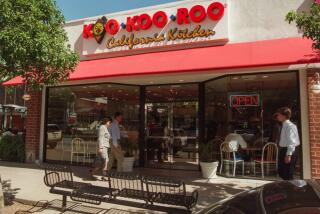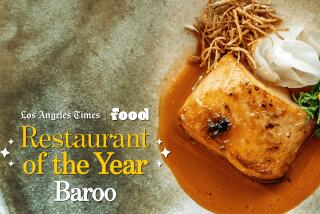Leg Room for 1 More Chicken Chain? Milken Trust Thinks So
- Share via
The world may not be sure it needs another chicken restaurant chain, but former junk bond financier Michael Milken apparently sees room for at least one more.
Koo Koo Roo Inc., a small chain operating mostly on the Westside of Los Angeles, is in talks to receive a $55-million capital infusion from a partnership whose principal investors include a trust for Milken’s three children.
Milken himself is not a party to the transaction, but his belief in Koo Koo Roo’s potential has already become well-known in investment circles around town.
Robert M. Fell, who heads Archon Capital Partners on behalf of the Milken trust, said both he and Milken have eaten at Koo Koo Roo, “and we both had come to the (conclusion) independently that this was a damn good concept.”
If the deal between Archon affiliate Casual Dining Concepts Inc. and Koo Koo Roo is completed, it could provide the capital and impetus to finally expand the chain nationwide after several false starts in recent years.
Koo Koo Roo’s major menu items are flame-broiled skinless chicken, turkey and various salads, geared to health-conscious--and price-conscious--diners. The chain was the brainchild of restaurateur Michael Badalian in 1987, who sold control to former New Jersey mortgage banker Kenneth Berg in 1990.
Berg, a multimillionaire after selling his mortgage business to Primerica Corp. (now Travelers Corp.) in 1985, has been struggling for the past three years to find the right menu, store look and management for Koo Koo Roo.
In that period, he has opened new stores and closed others, leaving Koo Koo Roo with just eight restaurants currently. Six are in Southern California, including a Beverly Hills store that will open Saturday. One is in Miami and another is in the Taj Mahal casino in Atlantic City, N.J.
The stores offer eat-in and take-out service, and prices are comparable to those charged by competitors such as KFC, Boston Chicken and El Pollo Loco. But while Koo Koo Roo’s food has many loyal fans on the Westside, Berg’s slow pace in expanding may have given competitors in the nationwide chicken-restaurant war a leg up in finding choice sites and financial partners.
Boston Chicken, for example, plans to open 300 sites in Southern California alone via a franchise deal with CKE Restaurants, parent of Carl’s Jr.
Koo Koo Roo’s sales were just $1.4 million in the quarter ended March 29, the latest reported. That was up from $772,937 in the first quarter of 1993. The firm’s net loss in the first quarter of this year: $804,784, versus $438,740 a year earlier.
In need of deeper pockets and management help, Berg hooked up with Fell, whose Casual Dining Concepts Inc. was formed specifically by Archon to invest in restaurants. Koo Koo Roo would be Casual Dining’s first investment.
Fell, who like Milken is a Wharton MBA, is a founding partner of InterActive Partners, a venture capital firm funded by venture giant Kleiner Perkins Caufield & Byers. Fell has also been a longtime consultant in Hollywood; he was involved in the restructurings of Columbia Pictures and 20th Century Fox and in the RKO Pictures buyout.
His Archon partners include veteran merchant bankers Steven P. Fink and Ronald N. Beck.
While some Wall Streeters worry that the chicken restaurant concept has been over-hyped, Fell still sees chicken as “the food of the ‘90s.” And he argues that Koo Koo Roo’s food “is far superior to any other products I’ve seen” in the market.
But he also adds that the deal between Casual Dining and Koo Koo Roo so far amounts to a letter of intent and that he and his partners have yet to complete a full review of Koo Koo Roo’s potential. “We’ve got to be absolutely comfortable that you can expand this concept” nationwide, he said.
As structured, Casual Dining’s $55-million investment in Koo Koo Roo would give it a controlling stake. The investment would include a $45-million loan from Casual Dining to Koo Koo Roo in the form of senior secured notes, $5 million in exchange for preferred stock and $5 million from the purchase of 1 million new common shares.
Casual Dining would also get enough stock warrants, exercisable at $6 apiece, to guarantee it 51% ownership of Koo Koo Roo.
Berg, who owns 3.2 million of Koo Koo Roo’s 11.1 million shares (fully diluted), would be expected to stay on, though probably not as CEO long-term.
Koo Koo Roo’s potential hasn’t been lost on Wall Street: Its stock, at $8.375 on Nasdaq on Thursday, has risen from $5.125 earlier this year. The initial stock offering was in 1991 at $5 a share.
More telling is that the firm’s total stock market capitalization now is $93 million, which values each of its restaurants at $11.6 million--a whopping price tag. With that kind of valuation, the stock price arguably already reflects much of the future payoff from expansion. And given the structure of the proposed deal, ordinary shareholders should realize that Archon/Casual Dining stands to reap the bulk of any future returns.
Concept Value
One way to look at the market’s excitement over a restaurant chain is market capitalization per store: a company’s total market capitalization (stock price times number of shares outstanding) divided by number of stores operated. The numbers for various chains:
No. of Market cap. Cap. per store Chain stores (millions) (millions) Cheesecake Factory 9 $198 $22.0 Koo Koo Roo 8 93 11.6 Fresh Choice 43 108 2.5 Boston Chicken 359 807 2.3 CKE Restaurants 647 169 0.3 Sizzler 714 183 0.2
Source: Times research
More to Read
Inside the business of entertainment
The Wide Shot brings you news, analysis and insights on everything from streaming wars to production — and what it all means for the future.
You may occasionally receive promotional content from the Los Angeles Times.









